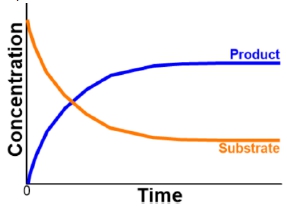So now that we're practically experts on amino acids, protein structure, and even protein techniques, in this video we're going to begin our discussions on protein function by starting to talk about enzymes. Most of you guys already know from your previous courses that most enzymes are globular proteins that catalyze or speed up the rate of chemical reactions without being consumed by the reaction. What we really mean by "without being consumed" is that by the end of the reaction, the enzyme takes on its original state that it had before the reaction took place. So, the enzyme is not chemically or permanently altered by the end of the reaction. It's important to note that not all enzymes are proteins, and that's because ribozymes are actually enzymes that are RNA catalysts, and they are made up of RNA nucleotides instead of amino acids. But moving forward in our course, most of the enzymes that we're going to talk about are going to be made up of proteins. So that's important to keep in mind.
Also, recall from your previous courses that the reactants of enzymes are called substrates, and the substrates will specifically bind to the enzyme at the enzyme's active site. Down below in our example, what you'll see is that this green structure here represents our enzyme, and the specific region of the enzyme that binds the substrate is referred to as the active site. In this example, it's this yellow structure here that is representing our substrate, which is the reactant of the reaction. What you'll notice is that the substrate will bind to the enzyme specifically at the enzyme's active site, and that's what we're seeing here. That forms what's known as an enzyme-substrate complex, which we'll talk more about later on in our course. But what you'll notice is that the enzyme is able to interact with the substrate in such a way that it can speed up or catalyze the chemical reaction, and it can produce the products here at a much faster rate than what the products would be produced if the enzyme were not present. Really, that's the main takeaway of this video: enzymes are able to speed up the rate of chemical reactions. Now in our next lesson video, we'll explain exactly how enzymes speed up the rate of chemical reactions. So I'll see you guys in our next video.




